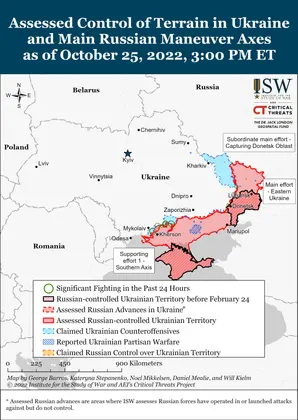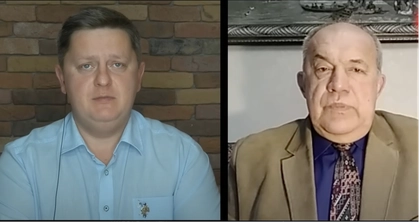Key Takeaways
- Russian siloviki factions continue to voice dissatisfaction with the Russian war effort in Ukraine, likely indicating that President Vladimir Putin will struggle to appease the pro-war faction.
- Direct confrontations between Putin and siloviki members regarding the war in Ukraine illustrate the significance of siloviki factions in Russian power structures.
- Russian officials are likely rhetorically realigning the war in Ukraine with religious ideals ostensibly accessible to both Christians and Muslims to cater to religious and ethnic minorities.
- Russian occupation officials continue to claim that the evacuations in Kherson Oblast are a part of a larger resettlement program.
- Levada polling surveys suggest that the Russian public’s sentiments toward the Russian government have not fundamentally changed despite societal pressures associated with the war in Ukraine.
- Russian sources claimed that Ukrainian forces conducted ground attacks west of Svatove and on Kreminna on October 25.
- Russian forces continued to establish fallback and defensive positions on the eastern bank of the Dnipro River.
- Russian forces conducted unsuccessful ground attacks in Donetsk Oblast.
- The Russian military continues to mobilize personnel in violation of recruitment policies. Russian mobilization efforts also are placing strains on the Russian labor market.
- Ukrainian partisans conducted an attack targeting the occupation head in Russian-occupied Zaporizhia Oblast.
Members of the Russian siloviki faction continue to voice their dissatisfaction with Russian war efforts in Ukraine, indicating that Russian President Vladimir Putin will continue to struggle to appease the pro-war constituency in the long term. The Russian siloviki faction refers to people with meaningful power bases within Putin’s inner circle who are fielding combat forces in Ukraine. Chechen leader Ramzan Kadyrov complained that the Russian response to claimed Ukrainian strikes on Russian territory have been “weak,” noting that Russia must “erase Ukrainian cities from the earth.” Kadyrov also claimed that Russia is now engaged in a war with Ukraine instead of a “special military operation,” given that Ukrainian forces are fighting on “Russian territory.” Kadyrov noted that he is unhappy with the lack of Russian retaliation despite the establishment of martial law. Kadyrov had remained relatively quiet throughout October.
JOIN US ON TELEGRAM
Follow our coverage of the war on the @Kyivpost_official.
Kadyrov’s statement indirectly criticizes the scale of the Russian missile campaign against Ukrainian energy infrastructure and is in line with milblogger critiques that followed days after the first massive campaign on October 10. ISW has previously assessed that that Putin’s missile campaign is unlikely to satisfy the pro-war nationalist camp in the long term, given that Putin cannot fix the many flaws within the Russian military campaign in Ukraine nor can he deliver his maximalist promises. Kadyrov’s rant also highlights Putin’s error in annexing four Ukrainian oblasts before Russian forces reached the oblasts’ borders, which has created confusion about where “Russian territory” begins. ISW has previously reported that Putin’s annexation of Ukrainian territories has likely triggered criticism within the Kremlin elite, which will likely intensify as Putin loses more occupied territories.

Exiles From Occupied Bakhmut Find Hope in Christmas Celebrations
Russian siloviki have also directly confronted Putin regarding the progress of the Russian war in Ukraine, which further highlights their significance within Russian power structures. The Washington Post, citing US intelligence, revealed that Wagner Group financier Yevgeniy Prigozhin sharply criticized the Russian Ministry of Defense (MoD) in a private conversation. Prigozhin reportedly accused the Russian MoD of heavily relying on Wagner forces while failing to finance the group or provide necessary resources, which is consistent with his numerous public statements. Prigozhin has denied ever criticizing the Russian Armed Forces in response to The Washington Post report—a denial that is patently false given his repeated public attacks on the MoD.
The criticism revealed by The Post further supports ISW’s assessment that Prigozhin holds a unique position that allows him to reap the benefits of Putin’s dependency on Wagner forces without having formal responsibility for any axis or area in Ukraine and while wielding considerable influence in the information space. Prigozhin is accumulating a following on Telegram (with some Wagner-affiliated channels having over 300,000 followers), is directly interacting with online publications, and is reportedly financing the RiaFan (Federal News Agency) media conglomerate. Prigozhin is likely using a growing number of platforms to accrue power and has even previously engaged RiaFan in promoting his September prisoner recruitment drive to Russian audiences. Putin’s regime is largely dependent on Putin’s monopolization of the state information space, but Prigozhin is increasingly challenging that monopoly.
Prigozhin’s influence in the information space is evident through the positive portrayal of Wagner forces, despite their failure to make significant advances in the Bakhmut area. Wagner forces have yet to reach Bakhmut despite fighting there since early summer and are reportedly suffering significant losses. Prigozhin himself admitted that Wagner forces advance only 100-200 meters a day, which he absurdly and falsely claimed is the norm for modern warfare. Wagner forces are plagued with the same supply and troop quality issues that Prigozhin‘s criticizes the Russian MoD for allowing to occur within the Russian Armed Forces. Prigozhin, for instance, denied seeing a video in which Wagner troops complained about the lack of food and supplies. The Ukrainian Main Military Intelligence Directorate (GUR) also noted that Wagner prisoner recruits suffer from serious infectious diseases like HIV and Hepatitis C, and that Russian doctors are refusing to assist a growing number of infected troops when they are wounded in combat.
Prigozhin is able to shape the narrative within Russian milblogger community by consistently deflecting attention from his forces by demeaning the Russian higher military command. He will likely retain his upper hand despite his forces’ lack of advances given the Russian information restrictions on the Russian MoD. Prigozhin’s close interactions with the media and online community allows him to address any criticism or unfavorable narratives in real time, unlike the Russian MoD or the Kremlin. Prigozhin, for example, denied his involvement with Russian war criminal Igor Girkin less than a day after Russian milbloggers suggested that Girkin is forming a Wagner-based volunteer battalion.
Russian officials are increasingly attempting to rhetorically align Russia’s war in Ukraine with religious concepts ostensibly accessible to both Christians and Muslims, likely in order to cater to religious minority groups within the Russian armed forces. Assistant Secretary to the Russian Security Council Alexei Pavlov amplified statements made by Chechen Republic Head Ramzan Kadyrov on October 25 that the goal of the war in Ukraine should be “complete de-Satanization.” Pavlov claimed that Ukrainian society is defined by “fanatics” who seek to abandon values held by the Russian Orthodox church, Islam, and Judaism. Kadyrov also declared that the war on Ukraine is now a jihad against Ukrainian “Satanism.”These statements may represent a desire to deflect dissent among religious minority groups in the Russian Armed Forces. As ISW previously reported, recent schisms between Muslim and non-Muslim servicemen have caused violent outbursts in Russia ranks. The invocation of war on religious but not overtly Christian grounds is likely an attempt to transcend religious divides and set information conditions for continued recruitment of ethnic and religious minorities to fight in Ukraine.
Russian occupation officials continued to indicate that efforts to “evacuate” civilians in Kherson Oblast to the east bank of Dnipro River are part of a wider resettlement scheme. Kherson occupation deputy Kirill Stremousov claimed on October 25 that occupation officials have moved over 22,000 people from the west bank of the Dnipro to the east bank and that the administration’s “resettlement program” (программа переселения) is designed to accommodate 60,000 people. Stremousov’s statement seemingly admits that Russian occupation officials view the evacuations as precursors to the permanent resettlement of a large population of Ukrainians. It is unclear where Russian officials intend to “resettle” those who move from the west bank. The implication of a permanent program designed to resettle Ukrainians in other Russian-occupied territories, and even within Russia itself, may amount to a violation of international law. According to international law, an occupying power has the right to evacuate civilians for their safety with the necessary stipulation that such evacuations are temporary. The implication of a “resettlement program” seems to suggest that Russian officials intend to permanently resettle large parts of Kherson Oblast’s population.
Russian President Vladimir Putin held a coordination council meeting on October 25 in which Moscow Mayor Sergey Sobyanin expressed a need to enact additional security measures in border oblasts, likely indicating that the Kremlin intends to utilize recent martial law decrees. Putin also said that the Russian government needs to work at a high pace and according to an extremely realistic assessment of the national security situation. Sobyanin indicated that Russian officials are proceeding with planned security measures throughout the Russian Federation. These comments indicate that the Kremlin intends to utilize recent martial law declarations to ease mobilization and military efforts occurring within the Russian Federation.
Russian independent polling organization Levada posted survey results on October 25 showing that the number of Russians desiring change has declined despite recent societal stresses introduced by sanctions, mobilization, and the war in Ukraine. The Levada surveys conducted in late September show that the percentage of Russians who believe that Russia needs decisive, full-scale changes decreased from 59 percent in July 2019 to 47 percent in October 2022. The surveys show that the percentage of the Russian public that believes Russia needs only minor changes increased from 31 percent in July 2019 to 36 percent in October 2022 as did the number of Russians who said that Russia needs no change whatsoever, from 8 percent to 13 percent. The Levada surveys show that of those Russians desiring full-scale change, only 11 percent desire a change of government in some fashion. The Levada surveys also show that of those Russians desiring full-scale change, 10 percent desire that the war in Ukraine ends and that Russia begins negotiations with Ukraine. Many changes that Russians wish for are primarily focused on domestic economic issues.
You can also highlight the text and press Ctrl + Enter






